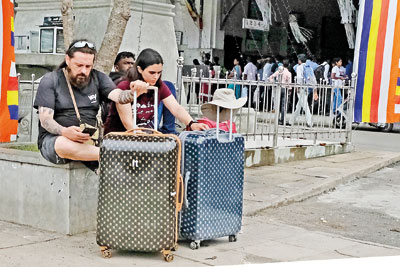News
Tourism sector wants safe country for Sri Lankans and visitors

Foreign tourists at the Fort Railway station. Pic by Amila gamage
The tourism industry suffered a further blow with last week’s sporadic incidents in the North Western Province and parts of Gampaha, as hoteliers began offering discounts of up to 70% in some instances.
“The attacks hurt tourism, and the riots hurt tourism. The riots caused the same security issues the terrorist attacks caused,” said Saliya Dayananda, president of the Cultural Triangle Hoteliers Association and the Co-chair person of the Association for Dambulla and Sigiriya Tourism Promotion.
The industry is particularly concerned about overseas travel warnings, said Mr Dayananda.
“The industry will slowly catch up, but only if the riots stop. It is the responsibility of the government to ensure the safety of the country, both to outside nationals and to its citizens. When our own people feel that it’s safe to walk around then the travel bans will be lifted automatically.”
The industry has cut prices and staffing levels, and reduced food and beverage services to attract domestic visitors.
A five-star hotel in Colombo offers 50% off on all rooms. A well-reputed beach hotel in Hikkaduwa offers low rates for a variety of packages. A Weligama resort had advertised packages of up to 60% off.
Mr Dayananda said hotels are trying to attract locals.
“There is a marginal improvement in hotel sales over the past two weeks. If sales were at 5% earlier, now they are at 7-8%. But in some hotels not even one room is occupied. They choose to shut down to save on electricity costs.”
Many hotels have sent their staff on paid leave, he said.
“Skilled labour in this industry is not in abundance, so we need to take care of them for when the industry eventually bounces back.”
Mr Dayananda said banks were supporting the service providers with moratoriums on capital and interest payments.
Committee member of the Sri Lanka Association of Inbound Tour Operators (SLAITO), Mr Nishad Wijetunga, said there are other segments that are suffering.
“Of course the hotels have been affected, but it is the inbound tour operators or the DMCs who are members of SLAITO that fills 60% percent of all of the hotels,” he said explaining the role of about 800 inbound tour operators and Destination Management Companies (DMCs) registered with Sri Lanka Tourism Development Authority, which contribute about 60% of the in-bound tourists.
“As long as the travel warnings are in place, overseas tour operators are prohibited from selling Sri Lanka as a destination.”
Overseas travel warnings are an obstacle to DMC operations. This has had a spillover effect to the rest of the industry.
Mr Wijetunga presented figures showing how National Parks had suffered greatly in terms of the numbers of visitors it receives on a daily basis.
The figures he presented showed that at Yala National Park, the number of vechiles has dropped from 400 a day to just two or three trucks a day.
They have leased the jeeps and can’t pay installments.
Minneriya, in mid-April, just a week before the attacks, showed over 50 trucks out in the morning and over 400 in the evening. A report on Wednesday shows just 16 trucks operating all day.
Mr Wijetunga said its not just the hotels that have suffered.
He said provincial suppliers of fruits, vegetables and meat to hotels have lost their business.
Along with this transport suppliers, operators who offer whale and dolphin watching packages, national tourist guides have all been affected greatly.
At the grassroots level more people are badly affected.
Mr Wijetunga said the government also stands to lose.
“National Parks like Yala and Minneriya are a massive source of income. The politicians keep stressing on hotels but this deserves concern as well.”
Overseas travel warnings have an adverse effect regardless of the season, Mr Wijetunga said, especially because visitors plan their holidays a year in advance.

